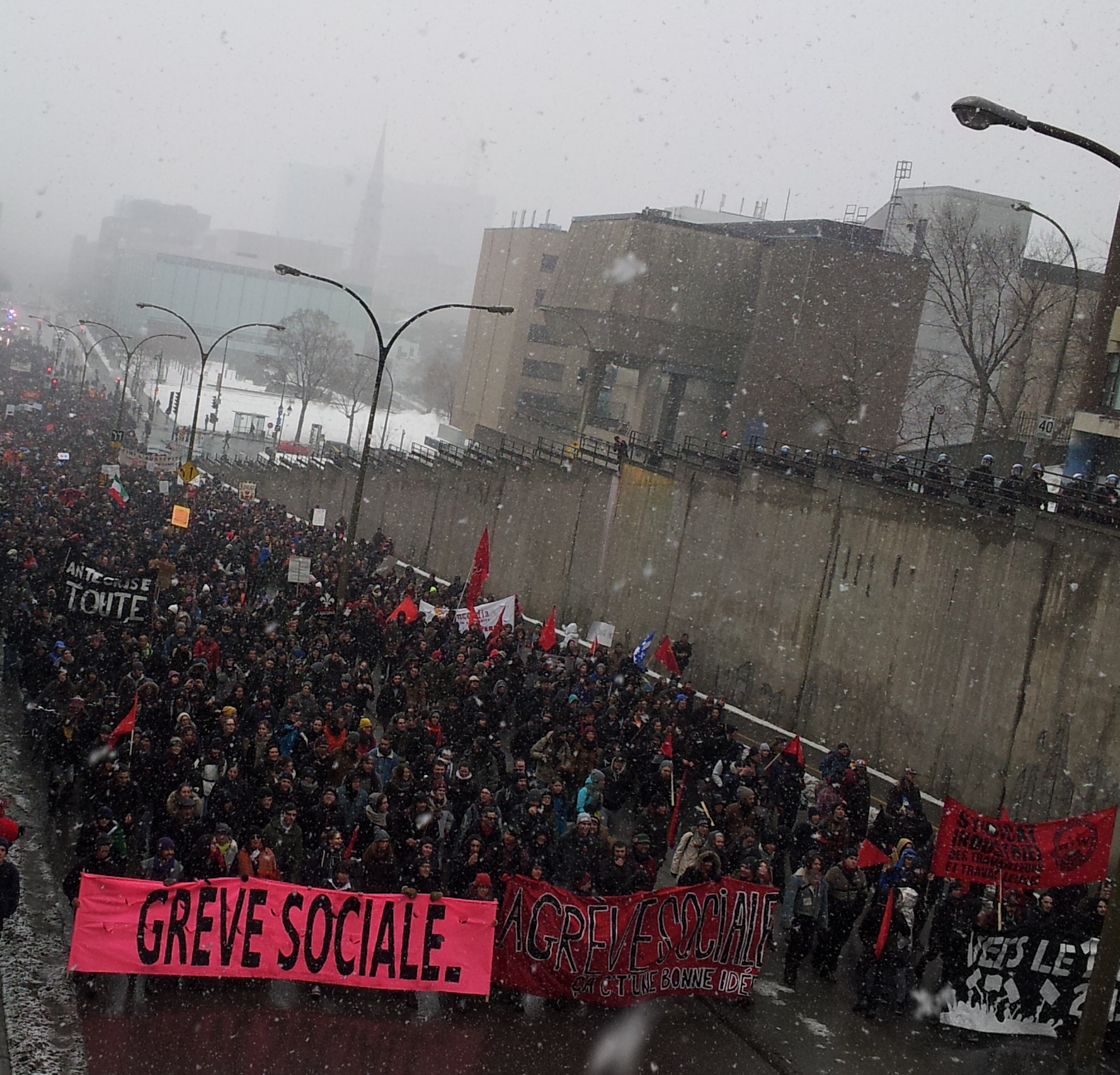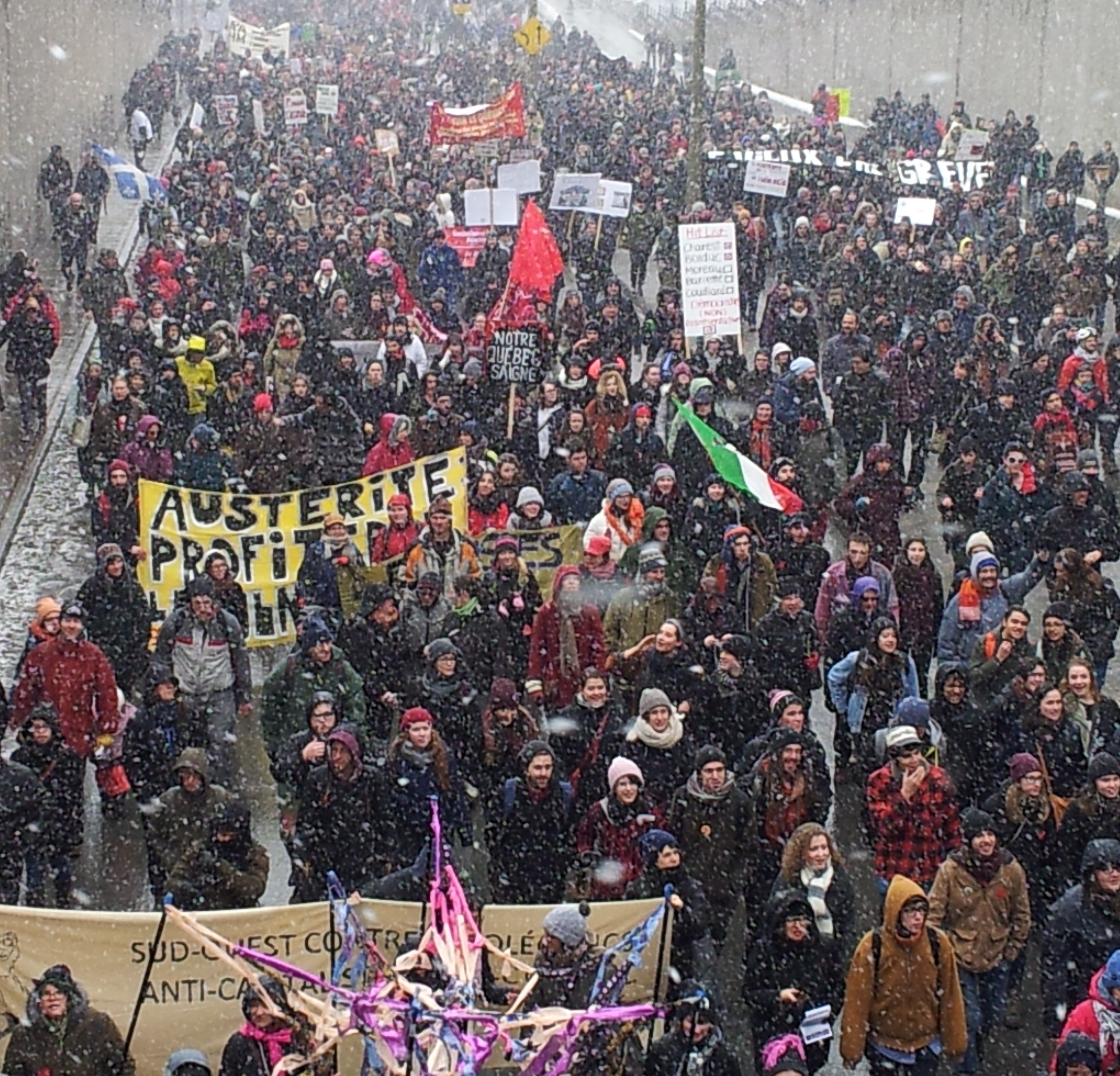Called by the Comité Printemps 2015 (Spring 2015 Committee), the “Popular Protest Against Austerity and the Petro-Economy” in Montreal on Saturday, March 21, was the spring’s first major demonstration in what many hope will be a heated season.
Despite persistent wet snow and a low grey sky, the protest grew several blocks long, noisily winding through downtown Montreal for several hours on Saturday afternoon.
At its start, the crowd at Place Émilie-Gamelin had hardly reached 1,000, and police were present in full force, walking in groups through the crowd, wearing riot gear, and some carrying tear-gas launchers.
Once the drum band started up and the crowd got walking the protest swelled, with turnout estimates ranging from 12,000 (99.999% Presse) down to 5,000 (Journal de Montréal).
Declared illegal but tolerated from the start by Montreal police, the SPVM, the event went relatively peacefully with one arrest made and three tickets issued.
Related events were held around Quebec, and a large anti-austerity protest was held in Madrid, Spain, “Bread, work, and a roof.”
Voices in the streets
“This is a good barometer to see what will be the next week, and the spring,” said Valentin, a 30 years old man peripherally involved in Printemps 2015 organizing, speaking near the front of the march an hour and a half in.
Asked why people were protesting, Valentin pointed to the actions of the current Liberal government, led by Philippe Couillard. “It’s nothing compared to the 2012 fees, it’s worse. And that’s only the first year of their mandate,” he said. “It’s not like a student concern, it’s a social concern.”
The upcoming Quebec budget, being tabled this Thursday, March 26, is expected to outline major cuts across the board to education, health care, daycare, environmental and other public services.

Véronique Bougie, walking in Montreal with her husband and their two-year old son, said, “I think it’s important to be here with our son to teach him that when there’s something that we’re not agreeing with our government, to speak out and put our opinion out there to hear us.”
Passing through the streets, onlookers waved or honked car horns in support while others were silent and a few yelled in opposition.
A man recently immigrated to Quebec from Algeria, Mohammed, watched the crowd go by from a distance and believed it was purely a student protest. “The students, they have reason,” he said. “It’s hard starting a life in debt.”
Mobilizing
The weeks leading up to Saturday’s demonstration saw a steady increase in the number of student associations in Quebec getting involved. 49,000 students are confirmed going on strike, with many starting on Monday March 23, and another 148,000 are planning votes on whether to strike.
McGill Medicine students, taking a more progressive stance than expected, are going on strike for one day, March 30, to protest Bill-20 which would substantially alter Quebec’s health-care system to push fees onto users. Medical students at major francophone universities have also voted to strike in protest.
Several student associations at Concordia have voted to strike and the university’s administration has been supportive of the right to strike.

But not all news was good before Saturday’s demonstration.
An article in major media outlet La Presse confirmed that the large public service unions were not preparing to go on an illegal strike, it not being worth the risk. For some this highlighted the challenges of fitting student and union mobilization together. However, as the president of one of the large unions, Daniel Boyer of FTQ, said “this does not mean we are not in solidarity in our respective struggles.” In addition, some local union organizations are mobilizing for the spring, with attention on the proposed social strike May 1.
Some discouraging news came the day before the protest as a prominent student association, Political Science and Law at UQAM (University of Quebec in Montreal), voted to dissolve, leaving that association hard pressed to be involved in the spring’s organizing efforts.
Despite the set-backs, once the drums started and the protest got moving, able to see its size with the help of elevation changes, a celebratory tone took hold. Through its course there was much cheering, chanting, dancing and friends bumping into each other in the crowd.
Demonstrations are being held Tuesday and Thursday evenings this week, and organizers hope the Saturday afternoon protests become a weekly fixture. “It gives the chance to the workers to get with us on the Saturday,” said Valentin.
Intersecting movements?
There were a number of environmental groups, in the crowd, like the Southwest (borough) Againt Pipelines, but the sentiment was overwhelmingly of opposing austerity.
Two weeks prior, for International Women’s Day on March 8, anti-austerity and anti-fossil fuel actions were held in Montreal led by women.

Saturday was also the International Day for the Elimination of Racial Discrimination, though there were few indications of solidarity with that struggle. Last year in Montreal on March 21, 2014, there was a significant protest centred around anti-oppressive and decolonial messages.
There were appeals to connect this past Saturday’s Printemps 2015 demonstration, which was notably pale-skinned, with anti-racist movements, but progress has been slow.
Coming up
Major protests coming up include a National Protest (Manifestation nationale) on April 2, the Act On Climate March in Quebec City April 11, and a wide-ranging Social Strike (Grève sociale) on May 1.
David Gray-Donald studied Environment & Biology at McGill University then worked there facilitating community sustainability projects and doing corporate social responsibility consulting. He is trying to undo our reliance on fossil fuels and educate himself on how to be a responsible adult male. He lives in Montreal and Toronto.
Photos: David Gray-Donald




